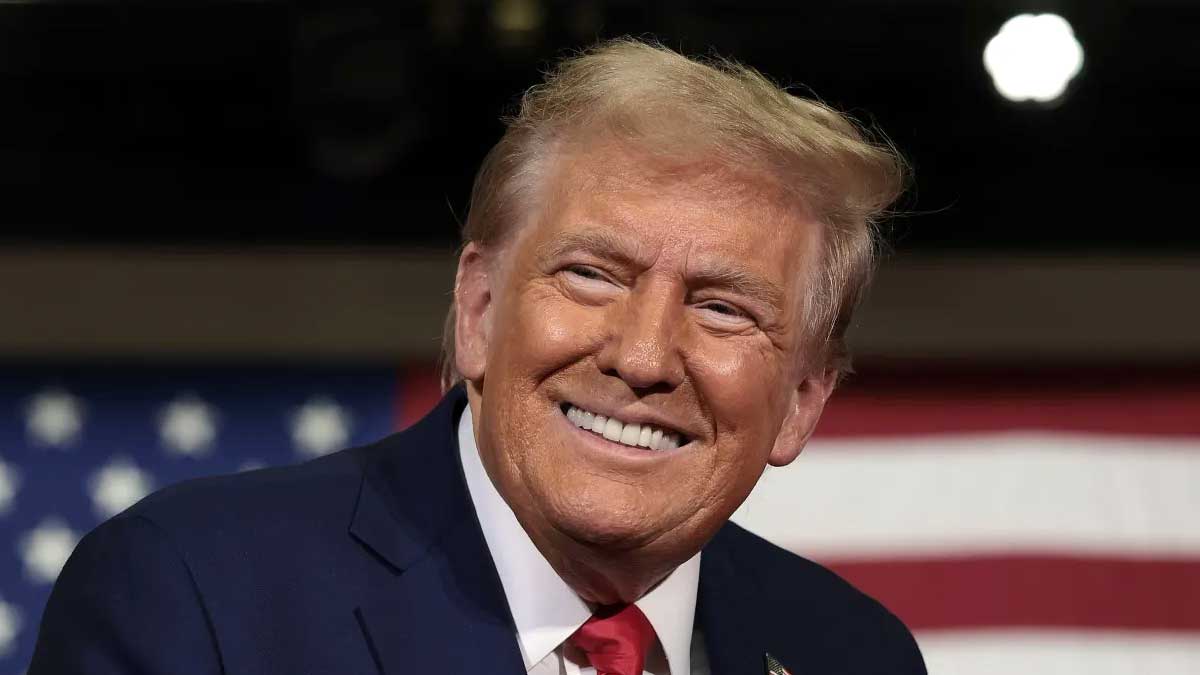- Home
- Billionaires
- Investing Newsletters
- 193CC 1000
- Article Layout 2
- Article Layout 3
- Article Layout 4
- Article Layout 5
- Article Layout 6
- Article Layout 7
- Article Layout 8
- Article Layout 9
- Article Layout 10
- Article Layout 11
- Article Layout 12
- Article Layout 13
- Article Layout 14
- Article Sidebar
- Post Format
- pages
- Archive Layouts
- Post Gallery
- Post Video Background
- Post Review
- Sponsored Post
- Leadership
- Business
- Money
- Small Business
- Innovation
- Shop
Recent Posts
Trump Moves $4B Stake in Truth Social Parent, Stock Drops 6%

Donald Trump recently transferred his 57% stake in Trump Media & Technology Group (TMGT) to a revocable living trust, according to a filing with the Securities and Exchange Commission (SEC). This move raised concerns about potential conflicts of interest during his presidency, as it could allow his oldest son, Donald Trump Jr., to trade the shares without violating any public pledges made by Trump not to sell his holdings in the company. This shift has had a noticeable impact on the value of Trump’s financial stake, contributing to a 6% drop in the stock price of TMGT’s parent company, Truth Social, on Friday.
As of the opening of trading on Friday, TMGT’s stock price had decreased to just over $33 per share, resulting in a loss of approximately $200 million in Trump’s net worth. On Thursday, his stake was valued at $4 billion, but by Friday, it had dropped to just over $3.8 billion. This sharp decline has intensified attention on the financial implications of Trump’s latest move and the future of his stake in the company, especially with the 2024 presidential election fast approaching.
Trump transferred 114.75 million shares to the Donald J. Trump Revocable Trust on Tuesday, according to the SEC filing. By doing so, Trump effectively moved the ownership of these shares out of his direct control, although he still retains the financial benefits of the stake. Under the new arrangement, his son Donald Trump Jr. is listed as the sole trustee. This means that Trump Jr. now has voting and investment powers over the shares held in the trust, raising questions about whether these shares could be traded during Trump’s presidency.
Despite the transfer, Trump has repeatedly stated that he has no intention of selling his shares in Trump Media. However, the situation is more complicated than it may initially appear. According to The New York Times, the arrangement with the trust could technically allow Trump Jr. to sell the shares without violating Trump’s public pledge not to sell them. This gives the appearance of separation between Trump and his financial interests, but in reality, it opens up the possibility that shares could be sold without breaching any legal or ethical commitments made by the former president.
The move to place the shares into a revocable trust is part of a broader strategy that Trump has used to manage his financial assets while avoiding potential accusations of conflicts of interest. When he ran for president in 2016, Trump moved a portion of his assets into a similar trust, and he made additional transfers before his inauguration in 2017. These transfers included real estate holdings, various assets, and liabilities, all of which were placed under the control of his family and close associates.
While Trump has claimed that the trust is designed to keep his financial dealings separate from his public office, critics have long argued that such arrangements do not fully insulate him from conflicts of interest. Despite the legal structure of the trust, many experts contend that Trump’s family and associates still control key assets, meaning he could still be influenced by his financial holdings, even if he is not directly managing them.
Trump’s decision to move his shares into the trust has raised additional ethical concerns. While the structure of the revocable trust is designed to give Trump Jr. control over the investments, there are lingering questions about whether this arrangement will adequately shield Trump from allegations of conflicts of interest. This is not the first time Trump’s financial dealings have come under scrutiny, and it is unlikely to be the last as the 2024 election looms.
The volatility of Trump Media’s stock has been well-documented since the company went public in March 2021 through a reverse merger with Digital World Acquisition Corp. The stock price has fluctuated significantly, with major spikes following Trump’s election victory and political campaign announcements. These movements in the stock have had direct implications for Trump’s net worth, with some estimates indicating that his holdings in the company have added hundreds of millions of dollars to his fortune.
Trump has repeatedly stated that he would not sell his shares in Trump Media, despite the fact that some of the company’s executives, such as CEO Devin Nunes and CFO Philip Juhan, have made plans to liquidate their own holdings. Trump’s influence over the company remains significant, even though he does not hold an executive position within the organization. He has had a hand in selecting board members who have also played roles in his administration. For instance, Kash Patel, a former Trump administration official, was appointed to head the FBI, and Linda McMahon, the former WWE CEO, was nominated as Education Secretary. Nunes, too, was tapped for an important role in Trump’s administration, as he was appointed to lead the President’s Intelligence Advisory Board, though he remained at Trump Media.
The decision to move his stake into the trust may be part of Trump’s ongoing efforts to shield his financial interests from scrutiny as he positions himself for a potential return to the White House. Given the volatile nature of Trump Media’s stock and the ongoing political pressure, it remains to be seen how this trust arrangement will impact both his personal finances and the broader political landscape as the 2024 election nears.
Trump’s net worth has been estimated at $6 billion, making him the 525th richest person in the world, according to recent reports. While his stake in Trump Media represents a significant portion of his wealth, it is clear that his financial interests are deeply intertwined with his political career, raising ongoing questions about the ethical implications of his business dealings while in office. As his presidential campaign heats up, the scrutiny of his financial arrangements is likely to intensify, with many wondering whether this latest move will be enough to satisfy critics who argue that his wealth could influence his political decisions.
Recent Posts
Categories
- 193 Countries Consortium Partner1
- 193cc Digital Assets2
- 5G1
- Aerospace & Defense48
- AI37
- Arts3
- Banking & Insurance11
- Big Data3
- Billionaires1,506
- Boats & Planes1
- Business332
- Careers13
- Cars & Bikes79
- CEO Network1
- CFO Network17
- CHRO Network1
- CIO Network1
- Cloud10
- CMO Network18
- Commercial Real Estate7
- Consultant1
- Consumer Tech194
- CxO1
- Cybersecurity73
- Dining1
- Diversity, Equity & Inclusion4
- Education7
- Energy8
- Enterprise Tech29
- Events11
- Fintech1
- Food & Drink2
- Franchises1
- Freelance1
- Future Of Work2
- Games149
- GIG1
- Healthcare79
- Hollywood & Entertainment203
- Houses1
- India’s 1000 Richest1
- Innovation46
- Investing2
- Investing Newsletters4
- Leadership65
- Lifestyle11
- Manufacturing1
- Markets20
- Media327
- Mobile phone1
- Money13
- Personal Finance2
- Policy569
- Real Estate1
- Research6
- Retail1
- Retirement1
- Small Business1
- SportsMoney42
- Style & Beauty1
- Success Income1
- Taxes2
- Travel10
- Uncategorized15
- Vices1
- Watches & Jewelry2
- world's billionaires1,475
- Worlds Richest Self-Made Women2
Related Articles
South Korea Plane Crash: A Tragic Loss and Global Mourning
The tragic plane crash at South Korea’s Muan International Airport on Sunday...
By 193cc Agency CouncilDecember 30, 2024H-1B Visa Debate Splits Trump Allies and Silicon Valley
The debate over H-1B visas has once again become a contentious issue,...
By 193cc Agency CouncilDecember 28, 2024House Rejects Trump-Backed Funding Bill, Shutdown Looms
The U.S. House of Representatives rejected a new government funding bill on...
By 193cc Agency CouncilDecember 20, 2024Trump Named Time’s Person of the Year for Second Time
On Thursday, Time magazine honored Donald Trump as its “Person of the...
By 193cc Agency CouncilDecember 12, 2024















Leave a comment